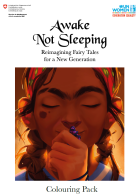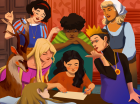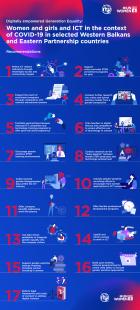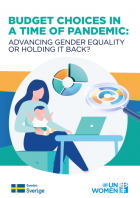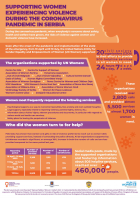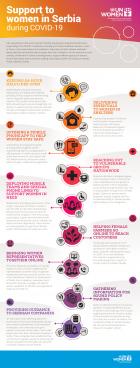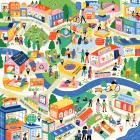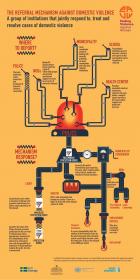1 - 20 of 45 Results
Pagination
Date:
Marysia Myanovska is a 33-year-old artist, conceptual photographer, volunteer and marketing manager of the VETERANKA Movement. She was born and lives in Kyiv. Through her photographic projects, Marysia shows how people from different generations can change and what influences these changes.
Date:
Holosy (‘voices’ in Ukrainian) is a new podcast series put together in partnership between UN Women Regional Office for Europe and Central Asia and The Hague Humanity Hub to look at the Russian invasion of Ukraine and subsequent war through a gender lens.
Date:
Welcome to Equal City! Here, led by young women and men, civil society organizations (CSOs), local authorities, universities and media work together to advance women’s rights, gender equality and women’s empowerment.
Date:
How would you colour a gender-equal world? UN Women’s Awake Not Sleeping collection reimagines 28 fairy tales for a new generation.
Date:
The UN Women Regional Office for Europe and Central Asia presents its new creative writing initiative, "Awake not sleeping: Reimagining fairy tales for a new generation". The powerful collection of fairy tales from across Europe and Central Asia aims to support fresh, creative dialogue to change the way societies think about women and girls’ roles, leadership and rights by rewriting and reimagining popular fairy tales.
Date:
The ‘Awake Not Sleeping’ initiative is driven by innovative feminist writers from diverse backgrounds and experiences from across Europe and Central Asia. They came together to create new fairy tales that will challenge gender norms and empower the next generation of citizens and leaders. Through their reimagined tales, they are moving us closer to building a gender-equal society.
Date:
As part of the Generation Equality campaign, seven distinguished local artists – from Albania, Georgia, Kosovo[1], Moldova, North Macedonia, Turkey, and the curator of the initiative from the United States of America – are starting a conversation on gender equality through mural art in Europe and Central Asia.
Date:
In the wake of COVID-19, digital technology has become a lifeline for millions around the world, and a critical tool to cope with the crisis--and its aftermath. While the pandemic is causing dual health and economic crises, it also represents a historical opportunity to accelerate the digital revolution.
Date:
Budget choices in a time of pandemic: Advancing gender equality or holding it back? report was produced under the regional project “Transformative Financing for Gender Equality towards more Transparent, Inclusive and Accountable Governance in the Western Balkans,” financially supported by SIDA. The infographics present immediate government responses, highlight their effects and provide guidance on making interventions gender sensitive.
Date:
My generation, your generation, let’s talk gender! A unique new podcast from UN Women’s Europe and Central Asia office connects gender equality activists from across generations and all walks of life.
Date:
Armed with information that flowed daily from the civil society organizations (CSOs) providing services to women survivors of violence across Serbia, UN Women acted swiftly and redirected funds to CSOs to support and continue essential service provision.
Date:
The survey measured the socio-economic impact of the pandemic and how it affected the livelihoods of women and men. It shows that COVID-19 has been disproportionately affecting women compared to men, and risks to deepen gender inequalities.
Date:
Due to the COVID-19 pandemic, millions of people across the world confined themselves to their homes. Gender inequalities, particularly for women in the home, are becoming increasingly apparent when it comes to housework and caring for children.
Date:
A profound shock to our societies and economies, the COVID-19 pandemic underscores society’s reliance on women both on the front line and at home, while simultaneously exposing structural inequalities across every sphere, from health to the economy, security to social protection. Explore these varied impacts and take a quiz to test your knowledge.
Date:
Like everywhere in the world, women in Serbia are playing a disproportionate role in responding to the COVID-19 outbreak, including as frontline healthcare workers, carers at home, community leaders and mobilisers. Experience of other disease outbreaks shows that this care burden also increases their risk of infection. As the coronavirus crisis unfolds, UN Women in Serbia is working hard to support different groups of women, ensure their equal voice in decision-making, and analyze COVID-19’s impact on women.
Date:
Looking for ways to raise a feminist or to keep your kids entertained in quarantine? Encourage the next generation of activists by making gender equality a creative learning activity. From sharing the care load to women taking charge, explore the world of Generation Equality with these printable colouring sheets for children of all ages.
Date:
In times of crisis, violence against women and girls is likely to increase as security, health, and money worries heighten tensions and strains are accentuated by cramped and confined living conditions.
Date:
BREAKING NEWS: We found a country that has achieved gender equality! In Equiterra all people have equal rights and opportunities, regardless of their gender. Women and girls feel safe when walking at night. They get paid equally as men, for work of equal value. Men and women share chores and care duties at home, and they can access high quality care at affordable rates.
Date:
Four university students from Colombia and Palestine met with more than 100 Turkish and Syrian women in four different cities across Turkey to enable women to shine through Light the Dark photography workshops. At the workshops, language barriers were overcome through the common language of photography.
Date:
More than half of municipalities in Albania have a dedicated mechanism that aims to protect and support survivors of domestic and gender-based violence. It is composed of a team of community professionals who have institutional responsibility to respond and address the various needs of survivors of domestic violence.


